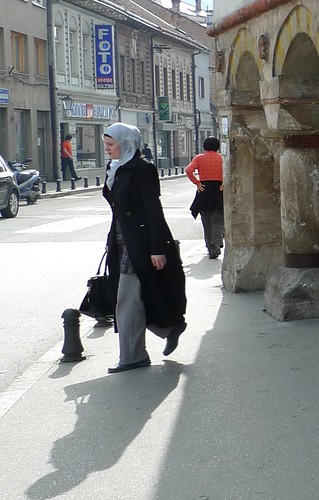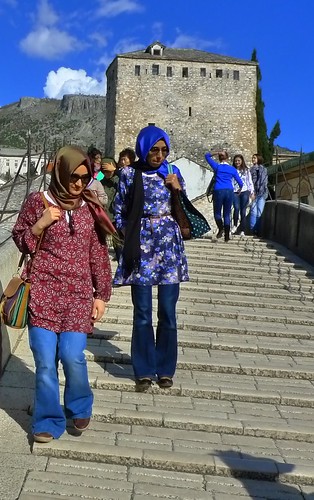When we were in Bosnia, a good friend wrote, "You All are BRAVE! To be going to the places that you are. Mostar, etc. Not brave in the sense that these places are dangerous, but brave in the sense that these are places of such recent and terrible cruelty. I’m honestly not sure I could do what you are doing – I would feel so weighed down with sadness."
1. We almost didn't go to Bosnia. Earlier this year there was news of violent protests all over Bosnia that had our Alarmist John all worried. He was constantly scouring the news, wondering about possibilities of routing around Bosnia, checking for State Department advisories. It's a good thing that we had decided to make a loop in Southeastern Europe instead of our original idea of going south to north in Eastern Europe; that is, Greece to Ukraine, before the Ukraine crisis broke out. That saved us a lot of back and forth.
2. We have a habit of passing up on sights that are directly connected to atrocities. For example, two of Sarajevo's top sites are the Tunnel Museum from the time of the Siege and the Srebrenica photo/video gallery. We didn't go. I can keep on naming places we skipped over the years. The only place I can think of that we did not skip was Auschwitz. Like our friend, we have limited capacity for sadness.
3. One thing made it easier for me to deal with the aftermath of the 1990s Balkans conflicts is that I hold the belief that all groups were guilty, all behaved badly, all suffered much, if not in equal parts. There is no clear innocent victim-group per se for which I feel particularly sympathetic, other than each of the individual lives that were affected. The history of the area is so complicated and confusing that it literally exhausted both of us during our trip research -- it's dizzying trying to keep things straight -- who did what to who and when over the past 2000 years. We have more studying planned for after we get home.
4. The whole time I was in the former Yugoslavia, for everyone I came across, a part of me is dying to ask about what happened to them, to their family and friends during the 1990s, while another part of me does not want to hear. More out of fear of pain for them, I never asked a single person.
5. For most part, I try to take everything as is, see places and people as they are today.
1. We almost didn't go to Bosnia. Earlier this year there was news of violent protests all over Bosnia that had our Alarmist John all worried. He was constantly scouring the news, wondering about possibilities of routing around Bosnia, checking for State Department advisories. It's a good thing that we had decided to make a loop in Southeastern Europe instead of our original idea of going south to north in Eastern Europe; that is, Greece to Ukraine, before the Ukraine crisis broke out. That saved us a lot of back and forth.
2. We have a habit of passing up on sights that are directly connected to atrocities. For example, two of Sarajevo's top sites are the Tunnel Museum from the time of the Siege and the Srebrenica photo/video gallery. We didn't go. I can keep on naming places we skipped over the years. The only place I can think of that we did not skip was Auschwitz. Like our friend, we have limited capacity for sadness.
3. One thing made it easier for me to deal with the aftermath of the 1990s Balkans conflicts is that I hold the belief that all groups were guilty, all behaved badly, all suffered much, if not in equal parts. There is no clear innocent victim-group per se for which I feel particularly sympathetic, other than each of the individual lives that were affected. The history of the area is so complicated and confusing that it literally exhausted both of us during our trip research -- it's dizzying trying to keep things straight -- who did what to who and when over the past 2000 years. We have more studying planned for after we get home.
4. The whole time I was in the former Yugoslavia, for everyone I came across, a part of me is dying to ask about what happened to them, to their family and friends during the 1990s, while another part of me does not want to hear. More out of fear of pain for them, I never asked a single person.
5. For most part, I try to take everything as is, see places and people as they are today.
- The country is beautiful. Montenegro has rugged moonscape mountains and picturesque Adriatic coast. BiH has so many crystal rivers and streams bubbling through, incomparable in any other part of the world we have been. Buildings damaged from war are still being repaired at differing rate. Religious institutions seem to have priority over civic ones.
- People seem to be particularly homogeneous. There are a lot of tall men, and some tall women. John had concerns of feeling like a dwarf. ;-) There are very few obese people and many folks seem to be particularly fit. The two of us constantly have the feeling that we are outpaced (literally) by older people.
- People are polite, kind, and ready to help. All young people seem to have some level of English. Cafe-ing with friends and family is huge, not so much eating out, probably more has to do with economics. In Bosnia, many women, young too, observe Muslim dress code to various degrees. I could not tell which ones are visiting from Turkey and whether their grandmother dressed more liberally.
- Streets seem particularly safe. Stores keep long hours. There is hardly any security or police for that matter. They had total breakdown of civilization less than 20 years ago and unemployment rate is high.
- Though I could not discern too many economic opportunities, there is good housing and transportation. People seem to be particularly generous with heat. Many of the building and restoration projects seem to be funded by EU. In Bosnia, the presence of various Islam countries can be felt.
- John thinks their lack of economy the opportunity has to do with scale. Montenegro has fewer people than our county. While BiH is theoretically one country, the Muslim part and Serbian part are administered separately -- it's almost like two countries.
- We bought a bag of muesli. Along with English it is printed with three southern Slavic languages. I asked locals which one is which. It's so similar, they can barely tell, since the spellings are purely phonetic. "A language is a dialect with an army and navy."
- In Montenegro I asked three locals what they are; one is a Serb, one is a Montenegrin, one is a Yugoslavian.
Fruit Muesli in 3 slavic languages plus English.
Woman in Travnik, Bosnia.

Women in Mostar, Bosnia.


6 comments:
Interesting. What I mostly noticed in those countries was how people were busy moving on. It was certainly jarring to see destroyed buildings still standing next to renovated ones (mostly in Bosnia).
I did visit the tunnel in Sarajevo, on a tour with a man who had been a fighter during the war, defending his city. I was impressed by how slender a life line it was, and there and in the museum, by the incredible hardships and determination of the citizens.
You have seen more headscarves than I did. I wonder whether that is an increase in tourism, or in religiosity.
Nothing I saw in the former Yugoslavia came close to the impact of Auschwitz, perhaps because I was visiting living cities where people were busy getting on with their lives, rather than a place of no hope.
Wow! Wow! What a philosophical turn. I'm not ready for this. I'm expecting beautiful photos of beautiful buildings and you want me to think? Oh, no.
I read The Cellist of Sarajevo for trip preparation, and found it very moving and powerful. We did go by a few of the sites in the book, not all bad, such as the brewery.
The synagogues we went in during this trip were very sad for me. The cubbyhole numbers and pew nameplates were as keen reminders as the piles of hair in Auschwitz.
While I'm happy for their religious freedom, I'd hate to see Bosniaks turn their culture into their religion. I'm hoping this Muslim dress code is more a fashion statement than religiosity.
Ed, Lately I've been writing the body of the blog plus doing the photos/captions as SL has been busy planning. But she made time to write this post. So I'm guessing you have noticed that I'm a "just the facts" kind of writer while with SL you get analysis, philosophy and opinion. ;-)
Your analysis of the former Yugoslav countries is similar to mine. I also thought that people looked pretty homogenous and not ethnically diverse. And yes people are thin there - particularly Croatia. I noticed a lot of mosques in the Serb Republic entity in Bosnia. Hopefully that means that people feel safe to move back there.
I'm out of Iran now (in Heathrow waiting for a flight to New York) so I can see your blog once more.
@Charles, welcome back to the free world!!! This mosque business is complicated. Bosnia Muslims historically were not particularly religious. It's more their heritage and culture. I suspect some of mosque-rebuilding money came from the Middle East. I'd hate to see Bosnia turn into Saudi Arabia. We were mostly in Bosnia, not much in Srpska, so I was more curious whether the Serbs and Croats had returned. In Jajce the Orthodox church has not be rebuilt. In Travnik the Orthodox church still has bullet holes, but there were new graves in the cemetery. I did read reports of returnees. I hate keeping such tabs.
Post a Comment